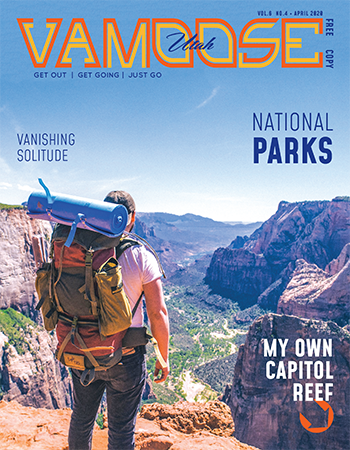The Tao of a cross-country mountain bike racer turned best-selling author
From the age of 16, mountain-bike racer Brock Cannon has worked to carve out a niche as an ultra-endurance cyclist, and he’s found success both on and off the trail. Today, he feeds his competitive edge as part of the Cole Sports Elite race team even while traveling and working as a best-selling author of The Switchback Approach.
Ultra racing is impressive at any point, but it takes exceptional cardiovascular endurance, efficiency in the sport and correct training, so as not to burnout. “I definitely used to feel burnout and overtraining when I was a younger kid,” Cannon says. “I’d go hard early in the season, and be pretty cooked by July. Nowadays, skiing until April helps me a lot, and then I come into peak fitness around late summer, just in time for the more important races.”
He wants to be challenged when he trains. “I like to surround myself with people who are faster than me. At one point, racing pro—even though I was at the back of the pack—I felt like I was being pushed as a whole, because the speed of the pack was faster,” he says.

Cannon speaks to his practically full-time training as a young athlete, with mentors such as Tinker Juarez, an endurance athlete who also started at the age of 16 and captured two World Cup titles as well as the 24-hour Solo World Championship. “He’s tough, and one of the fittest riders I know, even in his 50s.” Cannon says. “I raced against him. It was surreal.”
Cannon says he was lucky to have the support of sponsors, coaches and a dedicated “bike mom” to gain elite experience. He soon accelerated in categories to more laps and a more competitive field of riders to compete with.
When he started at 16, the XC landscape was slightly different. With the first World Championship taking place in 1990, XC mountain biking seemed to be the most popular discipline of the sport. “The golden era for XC was in the ’90s,” says Cannon. “The money was not big, with riders making $30,000 a year, tops.” But he didn’t do it for the money, fame or attention. Rather, it was the love of the life and lure of adrenaline. “Now, the trend has gone to road racing.” he says. The opportunity to race is there, and though he doesn’t have any races pending, he hasn’t taken future races off the table.
 Many a top outdoor athlete struggles with a plan for his or her future. They wonder: Is their sport one they can sustain, and how long before they burn out? Getting into a sport is one thing, but maintaining it is another.
Many a top outdoor athlete struggles with a plan for his or her future. They wonder: Is their sport one they can sustain, and how long before they burn out? Getting into a sport is one thing, but maintaining it is another.
“It takes endurance and finding something you actually love to do,” Cannon says. Any mountain bike race demands you hold a steady, relatively high pace for the entire event. That pace is different for everyone and, usually, it’s where the mental focus comes into play. “Anyone can be in the game for a couple years, but when you find something you can love for a long time, there’s a difference. I can’t imagine now not [racing],” Cannon says.
A World Cup race in Napa Valley, Calif., in particular, taught him humility. “It was a humbling experience. I felt terrible; there was a lot of mud from the rain the day before, and I was demoralized,” he says. “At one point, a pro from Holland pushed my butt up the hill, and I asked him how he was so fast. His only answer was, ‘A lot of good training.’ Meanwhile, I thought to myself, ‘I’m going to go throw up now.’”
If you have a mountain bike, a helmet and a desire to work up your cardio system, cross-country racing is a good way to go. Building up your strength for short acceleration bursts and to overcome technical sections is something both Lycra-clad riders and casual weekend newbies can relate to. For those looking to get fit with XC, Cannon says, “It’s important to know your emotions. You can go from crying one second to being elated on a downhill section the next.” And knowing your plan is key. Riders training for events that take five hours or more need several long rides, or, as a basic, a series of moderately long ride days placed back-to-back. “When I talk to people about the 24-hour solo races, I think people get overwhelmed by that, so I talk to them more about how to identify what you love to do, and having fun with the process, then implementing that into a habit,” he says.
You can still find Cannon on his favorite winding trail in Park City, the trail that inspired his book The Switchback Approach, which starts at the Canyons and ends at the base of Murdock Peak. “It’s hard not to be inspired when you’re riding in an amazing aspen forest,” he says.
Cannon’s athlete discipline serves him well for his continued XC training as well as his focus on expanding his next book, coaching programs, and his upcoming “unplug” retreats this fall in Park City, Jackson Hole and Zion. A father and a vegan, Cannon’s reputation as a happy hippie who loves riding hasn’t faded. Cannon’s motto for kicking trail butt: “The person who is consistent over time is the person who’s going to win over time—not the most talented.”
Find out more at BrockCannon.com 



